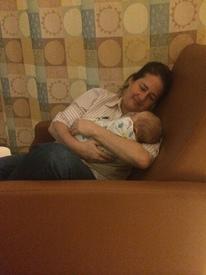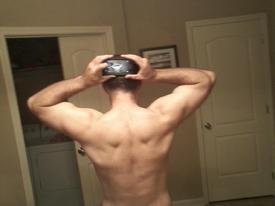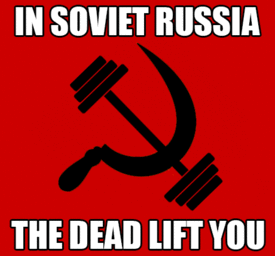Low heart rate

gretchens1
Posts: 16 Member
Hi! I'm a 39 year old woman, lead a sedentary lifestyle, and have approx 100 pounds to lose. I've been working out consistently for a month without any weight loss at all. I've recently purchased a heart rate monitor and discovered my heart rate rarely gets above 115-120 when I'm pedaling HARD on my bike, I'm talking near maximum exertion. Lifting weights doesnt get my heart rate above 100 bpm. No wonder why I'm not losing weight, I'm barely burning any calories. But I don't know what else I can do!
Anyone else have this problem? I cant run due to a back injury.
Anyone else have this problem? I cant run due to a back injury.
0
Replies
-
HR as a measurement in a vacuum is meaningless. What is your LTHR? What are you using to measure HR? What percent of max HR are you at when you think you're going all out?0
-
Are you on any medication?0
-
Your heart rate during exercise has no impact on weight loss. My HR gets up to 175 during lifting and weight loss is still slow and difficult.
ETA: Biking is relatively low impact. I'm sure your HR would go higher on another machine like the elliptical or stair-master.
If you aren't losing weight, you aren't in a deficit. Open your diary please. Do you use a food scale?0 -
Are you on BP medication? That can give a deceptively low heart rate. If so, be careful exercising. Actually, if so, check with your doctor before proceeding.0
-
My resting heart rate is approx 80 bpm and I'm shooting for at least 130 bpm. I've been using a brand new Polar brand heart rate monitor, but the NuStep machine (like a seated elliptical) at the gym has been giving me the same readings so I assume it is accurate. And yes, I take a daily antidepressant and over the counter allergy medication.0
-
Heart rate does not necessarily follow perceived effort, but if you really think you're exerting yourself and it's not reflected in your heart rate, then A. it is not being measured correctly or B. there is a potential medical issue or C. you have won the genetic coronary jackpot by inheriting a naturally healthy heart.
A. How are you measuring your heart rate? Are you using a HRM with a chest strap? Manually with fingers on your pulse and a clock? Are you using a machine that measures heart rate?
B. If you are sure that the heart rate is being measured correctly, then the next step is to have your heart checked by a medical professional. Your doctor will likely have you wear a Holter monitor for a day or two to record your heart rate continuously and watch for skipped or extra beats, and he will likely do an EKG, which will take pictures of your heart and show the size and shape of its various parts, and how the blood flows through them.
C. If nothing shows up for your doc, and you're having no symptoms (like fainting or dizziness), then you're just very lucky. People do cardio for years to strengthen their hearts in order to bring their heart rates down. A lower heart rate is a good thing as long as it's not being caused by something harmful, and as long as you're not feeling any negative symptoms. It means that your heart is very strong, and efficient at its job.0 -
For me, there does seem to be a direct correlation between weight loss and getting my heart rate higher for longer, so i am with you on wanting to see that rate climb.
my experience has been that my hr gets higher when i do exercises that require me to support all of my own weight, like an elliptical or a treadmill, as opposed to exercises where i get to sit down, like biking or rowing.0 -
gretchens1 wrote: »My resting heart rate is approx 80 bpm and I'm shooting for at least 130 bpm. I've been using a brand new Polar brand heart rate monitor, but the NuStep machine (like a seated elliptical) at the gym has been giving me the same readings so I assume it is accurate. And yes, I take a daily antidepressant and over the counter allergy medication.
If you don't mind me asking… What antidepressant do you take? What about the OTC allergy medication?
I will look it up in my nursing drug book.0 -
I take 20 mg Paxil daily and Zyrtec. The Paxil I've been on for about 3 years, the Zyrtec is more recent.
And I have an appointment with my doctor on 1/28, so I will definitely be talking to him about it.0 -
gretchens1 wrote: »I take 20 mg Paxil daily and Zyrtec. The Paxil I've been on for about 3 years, the Zyrtec is more recent.
And I have an appointment with my doctor on 1/28, so I will definitely be talking to him about it.
Definitely talk to the doctor. I could also me a lung capacity issue if you're short of breath, but not going full out according you your heart. My HR is low resting (40-50bpm) and I'll get it up over 185 while running and 165 while biking hard.0 -
It does seem odd that if you are 100 pounds overweight that your heart rate is recording so low during what you perceive as maximum exertion exercise. I have been working out for 3 years - distance running and weight lifting - have lost 95 pounds and my heart rate while running can still climb to 160's and during weight lifting to 120-130s. I recommend speaking to the doctor or perhaps your new HRM is malfunctioning.
And as for not losing weight - that comes down to logging accuracy, weighing and measuring accurately to ensure you are in a true deficit.0 -
gretchens1 wrote: »I take 20 mg Paxil daily and Zyrtec. The Paxil I've been on for about 3 years, the Zyrtec is more recent.
And I have an appointment with my doctor on 1/28, so I will definitely be talking to him about it.
There is a moderate drug interaction between Paxil and Zyrtec. Taking the two can increase dizziness, drowsiness, difficulty concentrating, and impairment in thinking and judgement. You should avoid this combination unless your doctor has advised otherwise.
Common side effects of Zyrtec include drowsiness, dry mouth, dry nose, and dry throat. Abnormal heart rhythm is a rare side effect. There's no talk of Zyrtec causing a low heart rate.
Common side effects of Paxil include: Nausea, drowsiness, dizziness, difficulty sleeping, loss of appetite, weakness, dry mouth, sweating, blurred vision, and yawning. Slow heart rate (bradycardia) is listed but it is not known as to why it happens. It also states that if you experience a slow heart rate, to contact your doctor immediately.
ETA: Bradycardia is classified as anything below 60 BPM. You said your RHR is 80 BPM.
0 -
Yes, the doctor did recommend the Zyrtec, I have severe allergies and he deemed that one the safest. My heart rate has never been an issue before, only recently when I've been starting to work out again. And it is at my doctor and physical therapist's urging, I am only to do low impact cardio for now until my back and knee improve. It is just very frustrating that I'm not able to work out hard enough to make a difference. Very discouraging.0
-
gretchens1 wrote: »Yes, the doctor did recommend the Zyrtec, I have severe allergies and he deemed that one the safest. My heart rate has never been an issue before, only recently when I've been starting to work out again. And it is at my doctor and physical therapist's urging, I am only to do low impact cardio for now until my back and knee improve. It is just very frustrating that I'm not able to work out hard enough to make a difference. Very discouraging.
Are you experiencing any other symptoms?0 -
Nope, nothing at all. I've never worked out so consistently in my life and with a month of not losing more than 2 pounds I'm about ready to give up alltogether.0
-
You can't outrun a calorie surplus. Eat less. It works.

(I, like many many people, gained weight while training for a marathon. I promise, you can't out-exercise your diet.)0 -
gretchens1 wrote: »Nope, nothing at all. I've never worked out so consistently in my life and with a month of not losing more than 2 pounds I'm about ready to give up alltogether.
If you were experiencing chest pain, lightheadedness, fainting, seizures along with the lower HR during exercise, I'd be more concerned and I'm sure your doctor would be too.
You should obviously still let him/her know about it.
Do you use a food scale?0 -
gretchens1 wrote: »It is just very frustrating that I'm not able to work out hard enough to make a difference. Very discouraging.
You don't need to work out hard to burn fat, you just need a calorie deficit.
Also keep in mind that it's normal to retain some fluid temporarily when increasing exercise.. which is why the scale isn't accurate for tracking body fat.
Try verifying your heart rate manually. Here is how: https://www.youtube.com/watch?v=qPKVfT5L4X8
https://www.youtube.com/watch?v=qPKVfT5L4X8
Also try using the elliptical machine for a few minutes. It tends to produce a higher HR. Set the resistance to 50% of maximum, and go fast.
0 -
1. I've been dieting as well. Measuring. Eating between 1400-1550 calories a day.
2. I am not supposed to use the elliptical at this point due to my injuries. Although I might start anyway.
3. I have checked my heart rate manually as well. It is low.
I know you are all trying to help - thank you for any advice you have. I know when all is said and done I will need to talk to my doctor and figure out what is going on.0 -
gretchens1 wrote: »1. I've been dieting as well. Measuring. Eating between 1400-1550 calories a day.
2. I am not supposed to use the elliptical at this point due to my injuries. Although I might start anyway.
3. I have checked my heart rate manually as well. It is low.
I know you are all trying to help - thank you for any advice you have. I know when all is said and done I will need to talk to my doctor and figure out what is going on.
Your low heart rate isn't the reason you aren't losing weight. Not being in a calorie deficit is the reason you aren't losing. Antidepressants can also cause weight loss to be rather difficult and slow (I am all too familiar with this as I am on AD's).
Measuring cups/spoons aren't accurate. You need to weigh your food using a food scale. I highly suggest purchasing one. You can find them on Amazon or at a store like Bed, Bath & Beyond.
0 -
gretchens1 wrote: »1. I've been dieting as well. Measuring. Eating between 1400-1550 calories a day.
Eat less. (Whether or not that number reflects what you are actually eating, what you are actually eating is not working for you. Eat less.)3. I am not supposed to use the elliptical at this point due to my injuries. Although I might start anyway.
...So you can get hurt and then REALLY be sedentary? This is a bad idea. Talk to your doctor about what other exercises might work for you. Swimming, pool running or aquacize/aquarobics, low-impact aerobics classes, rowing machine, walking?
0 -
Even if a medication lowers heart rate, it does not affect calorie burn to a substantial degree. Calorie burn is based on weight + exercise workload, NOT directly on heart rate. Heart rate is just a "scale" that indicates intensity. The medication might change the "scale" ( e.g. A workload that used to result in a HR of 150 now results in 120), but it does not change the workload or the calories burned.
You have admitted that you are on low-level cardio. Unfortunately it sounds like you are in a situation where activity is limited and that will be an extra challenge. If you can't work out harder, is it possible to workout longer?0
This discussion has been closed.
Categories
- All Categories
- 1.4M Health, Wellness and Goals
- 394.2K Introduce Yourself
- 43.9K Getting Started
- 260.4K Health and Weight Loss
- 176.1K Food and Nutrition
- 47.5K Recipes
- 232.6K Fitness and Exercise
- 438 Sleep, Mindfulness and Overall Wellness
- 6.5K Goal: Maintaining Weight
- 8.6K Goal: Gaining Weight and Body Building
- 153.1K Motivation and Support
- 8.1K Challenges
- 1.3K Debate Club
- 96.4K Chit-Chat
- 2.5K Fun and Games
- 3.9K MyFitnessPal Information
- 15 News and Announcements
- 1.2K Feature Suggestions and Ideas
- 2.7K MyFitnessPal Tech Support Questions








